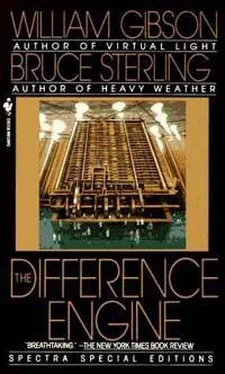William Gibson - The Difference Engine
Здесь есть возможность читать онлайн «William Gibson - The Difference Engine» весь текст электронной книги совершенно бесплатно (целиком полную версию без сокращений). В некоторых случаях можно слушать аудио, скачать через торрент в формате fb2 и присутствует краткое содержание. Жанр: sf_cyber_punk, fantasy_alt_hist, на английском языке. Описание произведения, (предисловие) а так же отзывы посетителей доступны на портале библиотеки ЛибКат.
- Название:The Difference Engine
- Автор:
- Жанр:
- Год:неизвестен
- ISBN:нет данных
- Рейтинг книги:3 / 5. Голосов: 1
-
Избранное:Добавить в избранное
- Отзывы:
-
Ваша оценка:
- 60
- 1
- 2
- 3
- 4
- 5
The Difference Engine: краткое содержание, описание и аннотация
Предлагаем к чтению аннотацию, описание, краткое содержание или предисловие (зависит от того, что написал сам автор книги «The Difference Engine»). Если вы не нашли необходимую информацию о книге — напишите в комментариях, мы постараемся отыскать её.
The Difference Engine — читать онлайн бесплатно полную книгу (весь текст) целиком
Ниже представлен текст книги, разбитый по страницам. Система сохранения места последней прочитанной страницы, позволяет с удобством читать онлайн бесплатно книгу «The Difference Engine», без необходимости каждый раз заново искать на чём Вы остановились. Поставьте закладку, и сможете в любой момент перейти на страницу, на которой закончили чтение.
Интервал:
Закладка:
Mallory took the letter-basket to his room, piled the mail on the floor beside his overflowing bureau, and left the Palace, dropping the basket at the desk on his way out.
A group of Quakers, men and women, stood on the pavement outside the Palace. They were droning another of their intolerable sermonizing ditties, something about a "railway to Heaven," by the sound of it. The song did not seem to have much to do with Evolution, or blasphemy, or fossils; but perhaps the sheer monotony of their bootless protests had exhausted even the Quakers. He hurried past them, ignoring their proffered pamphlets. It was hot, uncommon hot, beastly hot. There was not a ray of sun, but the air was mortally still and the high cloudy sky had a leaden, glowering look, as if it wanted to rain but had forgotten the trick of it.
Mallory walked down Gloucester Road to the corner of Cromwell. There was a fine new equestrian statue of Cromwell at the intersection; Cromwell was a great favorite of the Rads. And there were 'buses too, six an hour, but they were all crammed to the gunwales. No one wanted to walk in weather like this.
Mallory tried the Gloucester Road underground, by the corner of Ashburn Mews. As he prepared to descend the stairs a thin crowd came up at a half-run, fleeing a reek of such virulence that it stopped him in his tracks.
Londoners were used to odd smells from their under-grounds, but this stench was clearly of another order entirely. Compared to the sullen heat of the streets, the air was chill, but it had a deathly scent, like something gone rotten in a sealed glass jar. Mallory went to the ticket-office; it was closed, with a sign up saying WE APOLOGIZE FOR THE INCONVENIENCE. No mention of the actual nature of the problem.
Mallory turned. There were horse-drawn cabs at Bailey's Hotel, across Courtfield Road. He prepared to cross the street, but then noticed a cab waiting quite near him at the curb, apparently idle. Signaling the driver, he went to the door. There was a passenger still inside the cab. Mallory waited politely for the man to debark. Instead, the stranger, seeming to resent Mallory's gaze, pressed a kerchief to his face and half-sunk below the level of the window. He began coughing. Perhaps the man was ill, or had just come up from the underground and not yet caught his breath.
Annoyed, Mallory crossed the street and engaged a cab at Bailey's. "Piccadilly," he ordered. The driver clicked to his sweating nag and they rolled east up Cromwell Road. Once under-way, with a faint breeze at the window, the heat became less oppressive and Mallory's spirits rose. Cromwell Road, Thurloe Place, Brompton Road—in their vast rebuilding schemes, the Government had reserved these sections of Kensington and Brompton to a vast concourse of Museums and Royal Society Palaces. One by one they passed his window in their sober majesty of cupolas and colonnades: Physics, Economics, Chemistry… One might complain of some Radical innovations, Mallory mused, but there was no denying the sense and justice of fine headquarters for scholars engaged in the noblest work of mankind. Surely, in their aid to Science, the Palaces had repaid the lavish cost of their construction at least a dozen times.
Up Knightsbridge and past Hyde Park Corner to the Napoleon Arch, a gift from Louis Napoleon to commemorate the Anglo-French Entente. "The great iron arch, with its lavish skeleton of struts and bolting, supported a large population of winged cupids and draperied ladies with torches. A handsome monument, Mallory thought, and in the latest taste. Its elegant solidity seemed to deny that there had ever been a trace of discord between Great Britain and her staunchest ally, Imperial France. Perhaps, thought Mallory wryly, the "misunderstandings" of the Napoleonic Wars could be blamed on the tyrant Wellington.
Though London possessed no monuments to the Duke of Wellington, it sometimes seemed to Mallory that unspoken memories of the man still haunted the city, an unlaid ghost. Once, the great victor of Waterloo had been exalted here, as the very saviour of the British nation; Wellington had been ennobled, and had held the highest office in the land. But in modern England he was vilified as a swaggering brute, a second King John, the butcher of his own restless people. The Rads had never forgotten their hatred for their early and formidable enemy. A full generation had passed since Wellington's death, but Prime Minister Byron still often spattered the Duke's memory with the acid of his formidable eloquence.
Mallory, though a loyal Radical Party man, was unconvinced by mere rhetorical abuse. He privately entertained his own opinion of the long-dead tyrant. On his first trip to London at the age of six, Mallory had once seen the Duke of Wellington—passing in his gilded carriage in the street, with a clopping, jingling escort of armed cavalry. And the boy Mallory had been vastly impressed—not simply by that famous hook-nosed face, high-collared and whiskered, groomed and stem and silent—but by his own father's awe-struck mix of fear and pleasure at the Duke's passage.
Some faint tang of that childhood visit to London—in 1831, the first year of the Time of Troubles, the last of England's old regime—still clung to Mallory whenever he saw the capital. Some few months later, in Lewes, his father had cheered wildly when news came of Wellington's death in a bomb atrocity. But Mallory had secretly wept, stirred to bitter sorrow for a reason he could not now recall.
His seasoned judgment saw the Duke of Wellington as the outmoded, ignorant victim of an upheaval beyond his comprehension; more Charles the First than King John. Wellington had foolishly championed the interests of declining and decadent Tory blue-bloods, a class destined to be swept from power by the rising middle-class and the savant meritocrats. But Wellington himself had been no blue-blood; he had once been plain Arthur Wellesley, of rather modest Irish origin.
Further, it seemed to Mallory that as a soldier, Wellington had displayed a very praiseworthy mastery of his craft. It was only as a civil politician, and a reactionary Prime Minister, that Wellington had so thoroughly misjudged the revolutionary tenor of the coming age of industry and science. He had paid for that lack of vision with his honor, his power, and his very life.
And the England that Wellington had known and misruled, the England of Mallory's childhood, had slid through strikes, manifestos, and demonstrations, to riots, martial law, massacres, open class-warfare, and near-total anarchy. Only the Industrial Radical Party, with their boldly rational vision of a comprehensive new order, had saved England from the abyss.
But even so, Mallory thought. Even so, there should be a monument somewhere…
The cabriolet rolled up Piccadilly, passing Down Street, Whitehorse Street, Half-Moon Street. Mallory thumbed through his address-book, and found Laurence Oliphant's carte-de-visite. Oliphant lived on Half-Moon Street. Mallory had half a mind to stop the cab and see if Oliphant were at home. If, unlike most posh courtiers, Oliphant perhaps rose before ten, he might have something like a bucket of ice in his household and perhaps a drop of something to open the pores. The thought of boldly interrupting Oliphant's day, and perhaps surprising him at some covert intrigue, was a pleasant one to Mallory.
But first things first. Perhaps he would try Oliphant when his errand was done.
Mallory stopped the cab at the entrance to the Burlington Arcade. The gigantic iron-framed ziggurat of Fortnum & Mason lurked across the street, amid an array of jewelers and exclusive shops. The cabbie severely overcharged him, but Mallory took no notice, being in an expansive mood. It seemed the cabbies were imposing on everyone. Some small distance down Piccadilly, another man had leapt from his cab and was arguing, in a vulgar fashion, with his driver.
Читать дальшеИнтервал:
Закладка:
Похожие книги на «The Difference Engine»
Представляем Вашему вниманию похожие книги на «The Difference Engine» списком для выбора. Мы отобрали схожую по названию и смыслу литературу в надежде предоставить читателям больше вариантов отыскать новые, интересные, ещё непрочитанные произведения.
Обсуждение, отзывы о книге «The Difference Engine» и просто собственные мнения читателей. Оставьте ваши комментарии, напишите, что Вы думаете о произведении, его смысле или главных героях. Укажите что конкретно понравилось, а что нет, и почему Вы так считаете.









